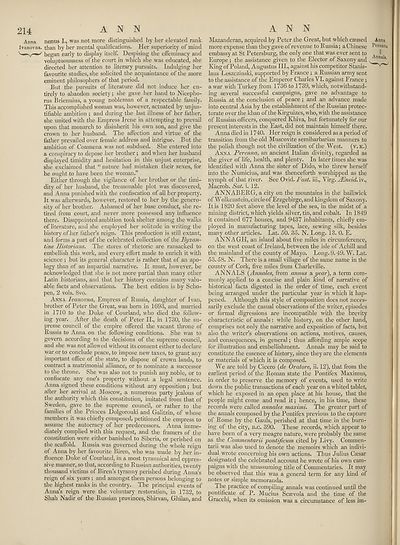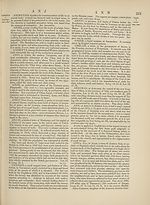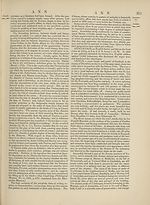Encyclopaedia Britannica > Volume 3, Anatomy-Astronomy
(222) Page 214
Download files
Complete book:
Individual page:
Thumbnail gallery: Grid view | List view

214 ANN
Anna norms I., was not more distinguished by her elevated rank
Ivanovna, than by her mental qualifications. Her superiority of mind
V**' began early to display itself. Despising the effeminacy and
voluptuousness of the court in which she was educated, she
directed her attention to literary pursuits. Indulging her
favourite studies, she solicited the acquaintance of the more
eminent philosophers of that period.
But the pursuits of literature did not induce her en¬
tirely to abandon society; she gave her hand to Nicepho-
rus Briennius, a young nobleman of a respectable family.
This accomplished woman was, however, actuated by unjus¬
tifiable ambition ; and during the last illness of her father,
she united with the Empress Irene in attempting to prevail
upon that monarch to disinherit his own son, and give the
crown to her husband. The affection and virtue of the
father prevailed over female address and intrigue. But the
ambition of Comnena was not subdued. She entered into
a conspiracy to depose her brother; and when her husband
displayed timidity and hesitation in this unjust enterprise,
she exclaimed that “ nature had mistaken their sexes, for
he ought to have been the woman.”
Either through the vigilance of her brother or the timi¬
dity of her husband, the treasonable plot was discovered,
and Anna punished with the confiscation of all her property.
It was afterwards, however, restored to her by the genero¬
sity of her brother. Ashamed of her base conduct, she re¬
tired from court, and never more possessed any influence
there. Disappointed ambition took shelter among the walks
of literature, and she employed her solitude in writing the
history of her father’s reign. This production is still extant,
and forms a part of the celebrated collection of the Byzan¬
tine Historians. The stores of rhetoric are ransacked to
embellish this work, and every effort made to enrich it with
science ; but its general character is rather that of an apo¬
logy than of an impartial narrative. It must, however, be
acknowledged that she is not more partial than many other
Latin historians, and that her history contains many valu¬
able facts and observations. The best edition is by Scho-
pen, 2 vols. 8vo.
Anna Ivanovna, Empress of Russia, daughter of Ivan,
brother of Peter the Great, was born in 1693, and married
in 1710 to the Duke of Courland, who died the follow¬
ing year. After the death of Peter II., in 1730, the su¬
preme council of the empire offered the vacant throne of
Russia to Anna on the following conditions. She was to
govern according to the decisions of the supreme council,
and she was not allowed without its consent either to declare
war or to conclude peace, to impose new taxes, to grant any
important office of the state, to dispose of crown lands, to
contract a matrimonial alliance, or to nominate a successor
to the throne. She was also not to punish any noble, or to
confiscate any one’s property without a legal sentence.
Anna signed these conditions without any opposition ; but
after her arrival at Moscow, a numerous party jealous of
the authority which this constitution, imitated from that of
Sweden, gave to the supreme council, or rather to the
families of the Princes Dolgorouki and Galitzin, of whose
members it was chiefly composed, petitioned the empress to
assume the autocracy of her predecessors. Anna imme¬
diately complied with this request, and the framers of the
constitution were either banished to Siberia, or perished on
the scaffold. Russia was governed during the whole reign
of Anna by her favourite Biren, who was made by her in¬
fluence Duke of Courland, in a most tyrannical and oppres¬
sive manner, so that, according to Russian authorities, twenty
thousand victims of Biren’s tyranny perished during Anna’s
reign of six years ; and amongst them persons belonging to
the highest ranks in the country. The principal events of
Anna’s reign were the voluntary restoration, in 1732, to
Shah Nadir of the Russian provinces, Shirvan, Ghilan, and
ANN
Mazanderan, acquired by Peter the Great, but which caused Anna
more expense than they gave of revenue to Russia; a Chinese Perenna
embassy at St Petersburg, the only one that was ever sent to . N ]
Europe ; the assistance given to the Elector of Saxony and ^ nDa s'
King of Poland, Augustus III., against his competitor Stanis-
laus Leszczinski, supported by France ; a Russian army sent
to the assistance of the Emperor Charles VI. against France ;
a war with Turkey from 1736 to 1739, which, notwithstand¬
ing several successful campaigns, gave no advantage to
Russia at the conclusion of peace; and an advance made
into central Asia by the establishment of the Russian protec¬
torate over the khan of the Kirguizes, who, with the assistance
of Russian officers, conquered Khiva, but fortunately for our
present interests in the East, did not maintain himself there.
Anna died in 1740. Her reign is considered as a period of
transition from the old Muscovite semibarbarian manners to
the polish though not the civilization of the West. (v. K.)
Anna Perenna, an ancient Italian divinity, regarded as
the giver of life, health, and plenty. In later times she was
identified wfith Anna the sister of Dido, who threw herself
into the Numicius, and was thenceforth worshipped as the
nymph of that river. See Ovid. Fast, iii., Virg. JEneid. iv.,
Macrob. Sat. i. 12.
ANNABERG, a city on the mountains in the bailiwick
of Wolkenstein, circle of Erzgebirge, and kingdom of Saxony.
It is 1820 feet above the level of the sea, in the midst of a
mining district, which yields silver, tin, and cobalt. In 1849
it contained 677 houses, and 9437 inhabitants, chiefly em¬
ployed in manufacturing tapes, lace, sewing silk, besides
many other articles. Eat. 50. 35. N. Long. 13. 0. E.
ANNAGH, an island about five miles in circumference,
on the west coast of Ireland, between the isle of Achill and
the mainland of the county of Mayo. Long. 9.49. W. Eat.
53.58. N. There is a small village of the same name in the
county of Cork, five miles from Charleville.
ANNALS {Annales, from annus a year), a term com¬
monly applied to a concise and plain kind of narrative of
historical facts digested in the order of time, each event
being arranged under the particular year in which it hap¬
pened. Although this style of composition does not neces¬
sarily exclude the casual observations of the writer, episodes
or formal digressions are incompatible with the brevity
characteristic of annals: while history, on the other hand,
comprises not only the narrative and exposition of facts, but
also the writer’s observations on actions, motives, causes,
and consequences, in general; thus affording ample scope
for illustration and embellishment. Annals may be said to
constitute the essence of history, since they are the elements
or materials of which it is composed.
We are told by Cicero (de Oratore, ii. 12), that from the
earliest period of the Roman state the Pontifex Maximus,
in order to preserve the memory of events, used to write
down the public transactions of each year on a whited tablet,
which he exposed in an open place at his house, that the
people might come and read it; hence, in his time, these
records were called annales maximi. The greater part of
the annals composed by the Pontifex previous to the capture
of Rome by the Gauls, perished at that time in the burn¬
ing of the city, B.c. 390. These records, which appear to
have been of a very meagre nature, were probably the same
as the Commentarii pontificum cited by Livy. Commen-
tarii was also used to denote the memoirs which an indivi¬
dual wrote concerning his own actions. Thus Julius Caesar
designated the celebrated account he wrote of his own cam¬
paigns with the unassuming title of Commentaries. It may
be observed that this was a general term for any kind of
notes or simple memoranda.
1 he practice of compiling annals was continued until the
pontificate of P. Mucius Scaevola and the time of the
Gracchi, when its omission wras a circumstance of less im-
Anna norms I., was not more distinguished by her elevated rank
Ivanovna, than by her mental qualifications. Her superiority of mind
V**' began early to display itself. Despising the effeminacy and
voluptuousness of the court in which she was educated, she
directed her attention to literary pursuits. Indulging her
favourite studies, she solicited the acquaintance of the more
eminent philosophers of that period.
But the pursuits of literature did not induce her en¬
tirely to abandon society; she gave her hand to Nicepho-
rus Briennius, a young nobleman of a respectable family.
This accomplished woman was, however, actuated by unjus¬
tifiable ambition ; and during the last illness of her father,
she united with the Empress Irene in attempting to prevail
upon that monarch to disinherit his own son, and give the
crown to her husband. The affection and virtue of the
father prevailed over female address and intrigue. But the
ambition of Comnena was not subdued. She entered into
a conspiracy to depose her brother; and when her husband
displayed timidity and hesitation in this unjust enterprise,
she exclaimed that “ nature had mistaken their sexes, for
he ought to have been the woman.”
Either through the vigilance of her brother or the timi¬
dity of her husband, the treasonable plot was discovered,
and Anna punished with the confiscation of all her property.
It was afterwards, however, restored to her by the genero¬
sity of her brother. Ashamed of her base conduct, she re¬
tired from court, and never more possessed any influence
there. Disappointed ambition took shelter among the walks
of literature, and she employed her solitude in writing the
history of her father’s reign. This production is still extant,
and forms a part of the celebrated collection of the Byzan¬
tine Historians. The stores of rhetoric are ransacked to
embellish this work, and every effort made to enrich it with
science ; but its general character is rather that of an apo¬
logy than of an impartial narrative. It must, however, be
acknowledged that she is not more partial than many other
Latin historians, and that her history contains many valu¬
able facts and observations. The best edition is by Scho-
pen, 2 vols. 8vo.
Anna Ivanovna, Empress of Russia, daughter of Ivan,
brother of Peter the Great, was born in 1693, and married
in 1710 to the Duke of Courland, who died the follow¬
ing year. After the death of Peter II., in 1730, the su¬
preme council of the empire offered the vacant throne of
Russia to Anna on the following conditions. She was to
govern according to the decisions of the supreme council,
and she was not allowed without its consent either to declare
war or to conclude peace, to impose new taxes, to grant any
important office of the state, to dispose of crown lands, to
contract a matrimonial alliance, or to nominate a successor
to the throne. She was also not to punish any noble, or to
confiscate any one’s property without a legal sentence.
Anna signed these conditions without any opposition ; but
after her arrival at Moscow, a numerous party jealous of
the authority which this constitution, imitated from that of
Sweden, gave to the supreme council, or rather to the
families of the Princes Dolgorouki and Galitzin, of whose
members it was chiefly composed, petitioned the empress to
assume the autocracy of her predecessors. Anna imme¬
diately complied with this request, and the framers of the
constitution were either banished to Siberia, or perished on
the scaffold. Russia was governed during the whole reign
of Anna by her favourite Biren, who was made by her in¬
fluence Duke of Courland, in a most tyrannical and oppres¬
sive manner, so that, according to Russian authorities, twenty
thousand victims of Biren’s tyranny perished during Anna’s
reign of six years ; and amongst them persons belonging to
the highest ranks in the country. The principal events of
Anna’s reign were the voluntary restoration, in 1732, to
Shah Nadir of the Russian provinces, Shirvan, Ghilan, and
ANN
Mazanderan, acquired by Peter the Great, but which caused Anna
more expense than they gave of revenue to Russia; a Chinese Perenna
embassy at St Petersburg, the only one that was ever sent to . N ]
Europe ; the assistance given to the Elector of Saxony and ^ nDa s'
King of Poland, Augustus III., against his competitor Stanis-
laus Leszczinski, supported by France ; a Russian army sent
to the assistance of the Emperor Charles VI. against France ;
a war with Turkey from 1736 to 1739, which, notwithstand¬
ing several successful campaigns, gave no advantage to
Russia at the conclusion of peace; and an advance made
into central Asia by the establishment of the Russian protec¬
torate over the khan of the Kirguizes, who, with the assistance
of Russian officers, conquered Khiva, but fortunately for our
present interests in the East, did not maintain himself there.
Anna died in 1740. Her reign is considered as a period of
transition from the old Muscovite semibarbarian manners to
the polish though not the civilization of the West. (v. K.)
Anna Perenna, an ancient Italian divinity, regarded as
the giver of life, health, and plenty. In later times she was
identified wfith Anna the sister of Dido, who threw herself
into the Numicius, and was thenceforth worshipped as the
nymph of that river. See Ovid. Fast, iii., Virg. JEneid. iv.,
Macrob. Sat. i. 12.
ANNABERG, a city on the mountains in the bailiwick
of Wolkenstein, circle of Erzgebirge, and kingdom of Saxony.
It is 1820 feet above the level of the sea, in the midst of a
mining district, which yields silver, tin, and cobalt. In 1849
it contained 677 houses, and 9437 inhabitants, chiefly em¬
ployed in manufacturing tapes, lace, sewing silk, besides
many other articles. Eat. 50. 35. N. Long. 13. 0. E.
ANNAGH, an island about five miles in circumference,
on the west coast of Ireland, between the isle of Achill and
the mainland of the county of Mayo. Long. 9.49. W. Eat.
53.58. N. There is a small village of the same name in the
county of Cork, five miles from Charleville.
ANNALS {Annales, from annus a year), a term com¬
monly applied to a concise and plain kind of narrative of
historical facts digested in the order of time, each event
being arranged under the particular year in which it hap¬
pened. Although this style of composition does not neces¬
sarily exclude the casual observations of the writer, episodes
or formal digressions are incompatible with the brevity
characteristic of annals: while history, on the other hand,
comprises not only the narrative and exposition of facts, but
also the writer’s observations on actions, motives, causes,
and consequences, in general; thus affording ample scope
for illustration and embellishment. Annals may be said to
constitute the essence of history, since they are the elements
or materials of which it is composed.
We are told by Cicero (de Oratore, ii. 12), that from the
earliest period of the Roman state the Pontifex Maximus,
in order to preserve the memory of events, used to write
down the public transactions of each year on a whited tablet,
which he exposed in an open place at his house, that the
people might come and read it; hence, in his time, these
records were called annales maximi. The greater part of
the annals composed by the Pontifex previous to the capture
of Rome by the Gauls, perished at that time in the burn¬
ing of the city, B.c. 390. These records, which appear to
have been of a very meagre nature, were probably the same
as the Commentarii pontificum cited by Livy. Commen-
tarii was also used to denote the memoirs which an indivi¬
dual wrote concerning his own actions. Thus Julius Caesar
designated the celebrated account he wrote of his own cam¬
paigns with the unassuming title of Commentaries. It may
be observed that this was a general term for any kind of
notes or simple memoranda.
1 he practice of compiling annals was continued until the
pontificate of P. Mucius Scaevola and the time of the
Gracchi, when its omission wras a circumstance of less im-
Set display mode to:
![]() Universal Viewer |
Universal Viewer | ![]() Mirador |
Large image | Transcription
Mirador |
Large image | Transcription
Images and transcriptions on this page, including medium image downloads, may be used under the Creative Commons Attribution 4.0 International Licence unless otherwise stated. ![]()
| Encyclopaedia Britannica > Encyclopaedia Britannica > Volume 3, Anatomy-Astronomy > (222) Page 214 |
|---|
| Permanent URL | https://digital.nls.uk/193760234 |
|---|
| Attribution and copyright: |
|
|---|---|
| Shelfmark | EB.16 |
|---|---|
| Description | Ten editions of 'Encyclopaedia Britannica', issued from 1768-1903, in 231 volumes. Originally issued in 100 weekly parts (3 volumes) between 1768 and 1771 by publishers: Colin Macfarquhar and Andrew Bell (Edinburgh); editor: William Smellie: engraver: Andrew Bell. Expanded editions in the 19th century featured more volumes and contributions from leading experts in their fields. Managed and published in Edinburgh up to the 9th edition (25 volumes, from 1875-1889); the 10th edition (1902-1903) re-issued the 9th edition, with 11 supplementary volumes. |
|---|---|
| Additional NLS resources: |
|

